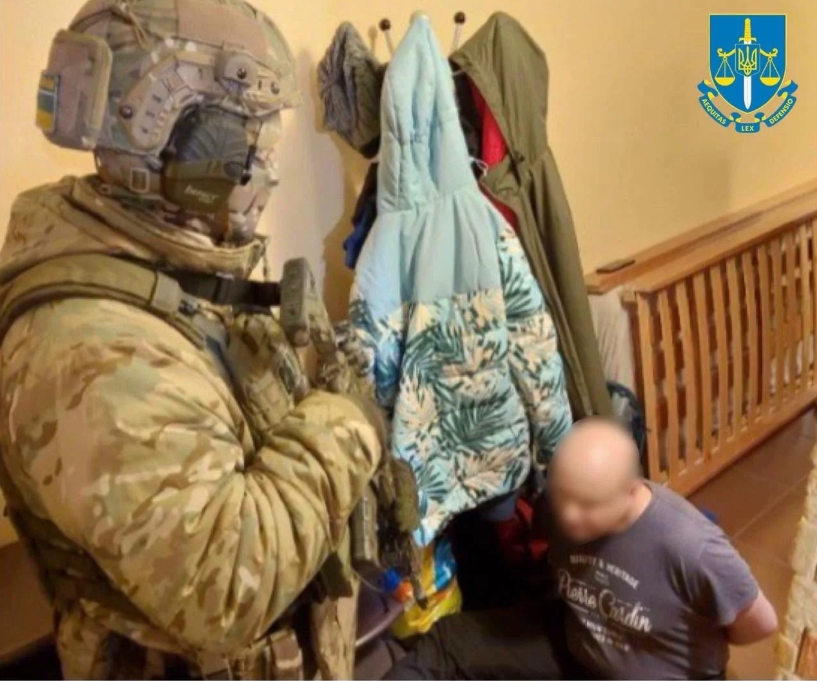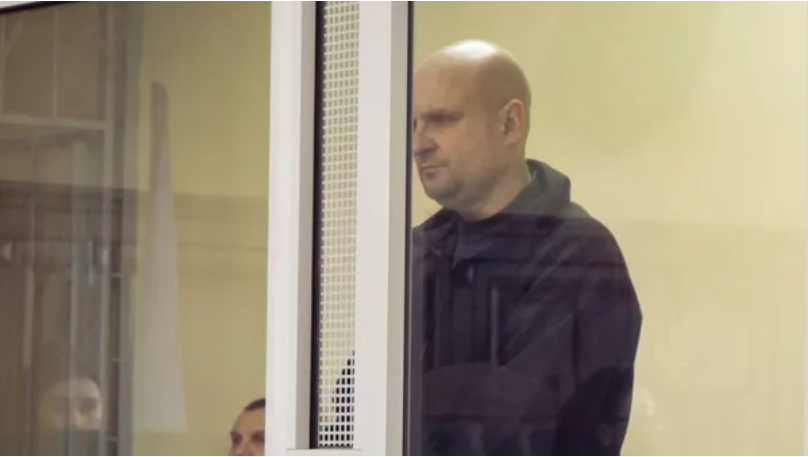On May 25, 2023, the Dniprovsky District Court of Cherkasy convicted Anatoly Ilyin, a rehabilitation doctor at the regional municipal hospital, of treason (Part 2, Article 111 of the Criminal Code of Ukraine) and sentenced him to 15 years in prison.
According to the prosecution, from November 2022 to January 8, 2023, Ilyin “used Telegram to send messages to an FSB representative of the Russian Federation, including screenshots with markings on Google Maps showing the locations of military facilities, military equipment, and Ukrainian Armed Forces and law enforcement personnel in Cherkasy and Cherkasy Oblast.” Anatoly Ilyin was detained on January 8, 2023, in accordance with Article 208 of the Criminal Procedure Code of Ukraine, i.e., at the scene of the crime.

The pre-trial investigation lasted almost three months, and the indictment was submitted to the Cherkasy District Court at the end of March 2023. The man pleaded guilty at the preliminary hearing but insisted on a full trial. The substantive hearing was scheduled to begin in May, but at the end of May, Ilyin made a plea bargain, confirmed that he had transmitted the data, and received his sentence.
Why didn’t Ilyin fight for a lesser sentence or reclassification under Article 114, which carries a lighter penalty, especially since the prosecutor even noted in court that no material, physical, or moral harm was caused to anyone?
The court emphasizes that it agreed not to confiscate Ilyin’s property, considering his sincere remorse and cooperation with the investigation. The 15-year sentence without property confiscation “was supported by the defense, given the increased public danger of the crime committed by the defendant against the foundations of Ukraine’s national security during martial law.”
Anatoly Ilyin has a wife and a minor child who live with him. His parents’ $1200 savings, set aside for a rainy day, were also returned. It’s easy to pressure someone by threatening their loved ones, especially since Article 111 could have involved property confiscation. This was likely the motivation for his confession.
The case materials state that “in early November 2022, an unidentified representative of the Federal Security Service of the Russian Federation… contacted Anatoly Ilyin, a resident of Cherkasy, with a proposal for confidential cooperation in the interests of the said Russian special service on an ideological basis.”
At the preliminary hearing, Anatoly said that a person with a Russian number started texting him in July 2022. They corresponded about the situation, i.e., the war. He doesn’t know if his interlocutor was an FSB employee. The anonymous contact only started giving Ilyin assignments in November 2022. The “unidentified FSB representative” asked Ilyin to find out the exact locations of checkpoints in Cherkasy and mark them on a map. He also tasked the doctor with finding out the mobilization situation in Cherkasy and the location of a certain warehouse.
Ilyin completed the task and, between November 9 and 30, sent information about the location of four checkpoints. He clarified a question about an airfield, saying he’d heard there were two fighter jets. According to SBU reports and statements, checkpoints and fighter jets were indeed present there during that period, and the information could have harmed the military. But it didn’t. There were no victims in Ilyin’s case.
Regarding mobilization, the doctor reported the following:
“As one soldier said, soon there will be no one left to fight. They’re plugging holes with poorly trained territorial defense forces. Very few professional Ukrainian soldiers remain. People don’t want to fight. Many who have money ‘resolve issues’ at the military enlistment office. That is, they hate Russia, but they don’t want to fight. I spoke with three soldiers, due to my work, and they say they want to be discharged. The military started underpaying soldiers. Instead of 100,000 hryvnias, they paid 60,000 for a month. The exchange rate is $1 = 40.50 hryvnias. Commanders are profiting from them. Something like that.”
On December 2, he himself wrote to the alleged FSB officer that he had driven past a village and saw objects rotating continuously in a field (“They say it’s a radar station. Do you need this?”) and sent a photo of a pink scrap of paper with a drawing of an object resembling a radar station. The “FSB officer” was pleased: “Anatoly, good afternoon! The object you drew is very interesting, especially its location! Can you mark it on the map? I will prepare a report for management and send it to Lubyanka! Thank you in advance for your help!”
Ilyin marked objects resembling radar stations on the map between the villages of Krasna Slobodia and Lesky. According to the SBU report, Ukrainian Armed Forces and air defense systems were deployed there at that time. No one was harmed. But according to the report, they could have been.
Things continued like this. Ilyin talked about how the military near Lesky and Khudyaki wouldn’t let anyone near the Dnieper River and the ponds, and “you can place anything you want there,” and about the completion of large-scale military exercises near Cherkasy in the village of Gerotshivka aimed at redeployment towards Kherson.

Then, on January 2, 2023, the “FSB officer” asked Ilyin to confirm information about the location of a Ukrainian Armed Forces radar station on the outskirts of Kanev in Cherkasy Oblast: “Earlier you talked about a radar station in the Cherkasy area. We recently received information about a similar object in the vicinity of Kanev. We have its coordinates, but we need to confirm whether it is actually there. This is a very important assignment, and we need a reliable person we trust. Time is short; it could be relocated at any moment. When will you have the opportunity to go to Kanev in the near future and check this information?”
The unidentified “FSB agent” sent the object’s coordinates and asked, in addition to marking it on the map, to take a photo or video of the military equipment, “so I can determine what kind of installation is there”: “There are no leaves now, the view should be good,” and asked him to go there next weekend.
Further from the case materials: “Subsequently, on January 8, 2023, at 11:10 a.m., Ilyin, fulfilling the task of the unidentified representative of the FSB of the Russian Federation, took a scheduled bus from Cherkasy to Kanev in Cherkasy Oblast to search for, record, and transmit information about the locations of the Ukrainian Armed Forces’ air defense forces on the banks of the Dnieper River in Kanev. Arriving in Kanev at 12:43 p.m. that same day, Ilyin, between 1:00 p.m. and 1:20 p.m., walked and visually inspected the bank of the Dnieper River…”
He went to a point opposite “Bald Mountain” in Kanev, marking the location of Ukrainian Armed Forces air defense equipment on Google Maps, before returning to Cherkasy by bus.
This entire beach outing in Kanev was recorded on video by SBU officers conducting covert investigative actions against Ilyin since November 17, 2022, maintaining surveillance and wiretapping his phone.
That evening, Anatoly Ilyin reported his observations to his contact, but didn’t send photos due to the lack of opportunity. The “unidentified FSB representative” thanked Ilyin: “Information received! Thank you for your assistance for the benefit of Russia!”
This is the only message from their correspondence that appeared in the case file not from an unknown source, but from the protocol of the examination of Ilyin’s phone contents. Ilyin hadn’t read or deleted it, as he was detained by SBU officers minutes later, at 6:15 PM.
Among the evidence cited in Ilyin’s case are: the fateful bus ticket to Kanev, a 50-ruble bill, his personal notebook with handwritten notes, including entries about friends in the Russian Federation, a trip to Crimea, and other entries.
The investigation revealed the following about the “FSB officer”:
-
- “an unidentified Russian citizen using the mobile phone number […] and likely a representative of the Russian Federation’s special services”;
-
- in 2019, the recipient’s number was used in Bryansk Oblast, Russia, by a person named Sergey in a car sales advertisement;
-
- this phone number is also linked to an Odnoklassniki social media page. The profile picture shows two white ground squirrels.
-
- the wall contains 72 photos depicting: a boy, pets, hairstyles, cars, etc. (the SBU notes this is irrelevant to the criminal case but includes it nonetheless);
-
- in the “About Me” section, the user stated that he was born on December 20, 2007 (15 years old) and lives in Bryansk (also noted as largely irrelevant, though the 15-year-old age of an FSB officer should raise questions for the court);
-
- this user is a member of 30 groups, three of which “have an overtly pro-Russian orientation”: “Political Review – We’re for Putin!”, “Vladimir Vladimirovich Putin”, and “I’m for Russia!!!” (this, unlike the previous point, was deemed important by the SBU).
Ilyin had the opportunity to appeal the verdict in the appeals court. He even filed an appeal requesting a reduced sentence of 8 years, but for unknown reasons withdrew the appeal and, along with his lawyer, requested the closure of the appeals proceedings. The court granted the request, and on August 30, 2023, the verdict came into force.
In Ilyin’s case, as in many others, there is no proof that he communicated with a representative of a foreign state’s special services. The SBU has a confession, video footage, and restored chats. However, it remains unclear why Ilyin was targeted, and there is no proof that his contact was affiliated with the FSB. There are no victims or damages. Therefore, there are grounds to suggest that Ilyin’s contact was an SBU officer, not an FSB officer, and the criminal case is the result of entrapment (“it wouldn’t have been committed if it hadn’t been provoked”).
This translation was made using a neural network. If you find any inaccuracies, please contact us.


